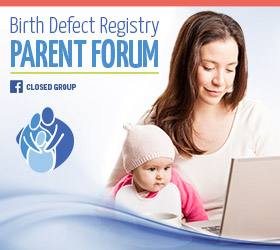How to Communicate With Health Care Providers
When your child is born with a birth defect or disability or you suspect that your child may have an undiagnosed problem, you want to find the very best medical care. Often you are not sure who to ask or where to go for advice. Many other families have already traveled the road you are about to embark on and they have shared some of the following strategies that may help you succeed in accessing the health care network.
Start with your primary care physician
Your family doctor or pediatrician can be a wonderful resource. You will feel more comfortable talking with your primary care doctor about your child’s problems because this professional already knows you and your family on a more personal level. Your family doctor can also help you find other physicians and medical centers that may specialize in your child’s condition. Although you may take your child to specialists several times a year, you will see your primary care doctor any time your child needs care for the usual illnesses of childhood.
Getting a diagnosis
Your child’s problems may have been diagnosed at the time of birth. But many times, only part of the disabilities have been diagnosed. Some medical conditions may not be identified until your child is several months or years old. It is frustrating for parents to suspect that something is wrong with their child, but not have a diagnosis for the problem.
There are many physicians, hospitals and clinics that specialize in the diagnosis and treatment of birth defects and childhood disabilities. You can find the medical center closest to your home by checking resource books at your public library. Two excellent resources are: The Best Hospitals in America by Linda Sunshine and John A. Wright, New York: Avon Books and The Best in Medicine: Where to Get the Finest Health Care for You and Your Family by Herbert J. Dietrich, M.D. and Virginia H. Biddle, New York: Harmony Books.
You become the expert
Once your child has been properly diagnosed you should begin to learn all you can about his/her medical condition through support groups, national information clearinghouses and public or university libraries and research on the internet. The more that you learn about the history, medical terminology and the possible prognosis for your child’s condition, the better you will be able to communicate with your child’s health care team.
How to communicate with doctors
Sometimes families feel intimidated when they are talking about their child’s condition with highly trained medical specialists. By using some of the following techniques you can feel like you have more control in this situation:
- Write down all the questions you would like answered.
- If the doctor cannot answer them at this visit, ask him/her to give you the answers later over the phone or in a letter.
- Bring all the medical records you have for your child to each appointment with a new doctor.
- Share copies of any research you have done about your child’s condition with your child’s physician.
- Take a friend or family member with you when you talk with your child’s physician.
- If no one can go with you to the meeting, take a tape recorder so you can review and remember exactly what you discussed with the doctor
- If you don’t have a tape recorder, take notes of your meeting.
Parent’s rights
Every family has a right to:
- Be treated courteously by the doctor and his/her staff.
- Have their questions and concerns answered to the best of the physician’s knowledge.
- Have any recommended treatments or surgeries and their risks versus benefits explained fully.
- Have their phone calls returned within a reasonable amount of time.
- Receive copies of their child’s medical records.
- Be seen at the scheduled appointment time, unless there is an unusual circumstance (like a medical emergency) that requires the physician’s immediate attention. In the case of a long delay, you should be given the option to reschedule your appointment.
Second opinions
If you are not comfortable with a recommended course of treatment, you have every right to ask for a second or third opinion from a different physician. A competent professional will not feel threatened by your request for another opinion. When you are dealing with unusual and often complicated birth defects and disabilities, there may be a variety of medical opinions that are equally valid.
You are the decision maker
When it comes to your child’s health and welfare, you are the final decision maker. After you have completed all the research, visited all the specialists and considered all the options, you have the right to make the decision that you feel is in the best interests of your child.
Fact Sheet by:
Birth Defect Research Children, Inc.
www.birthdefects.org







